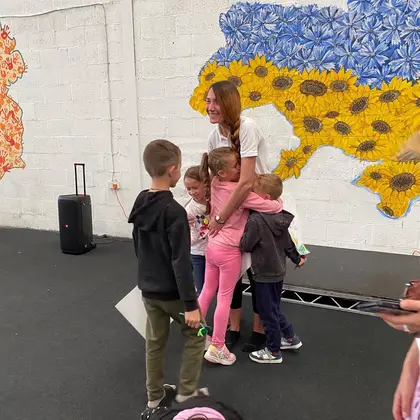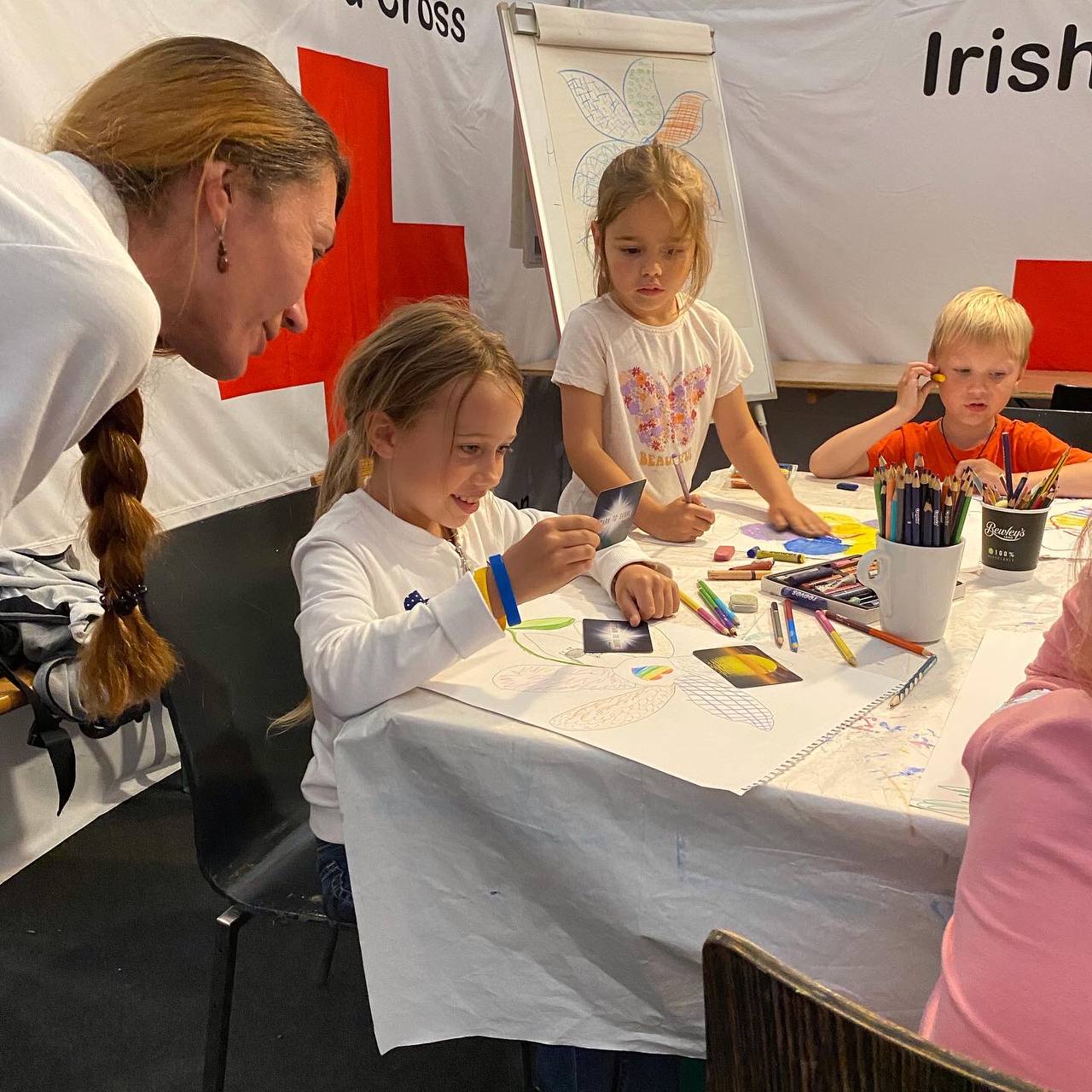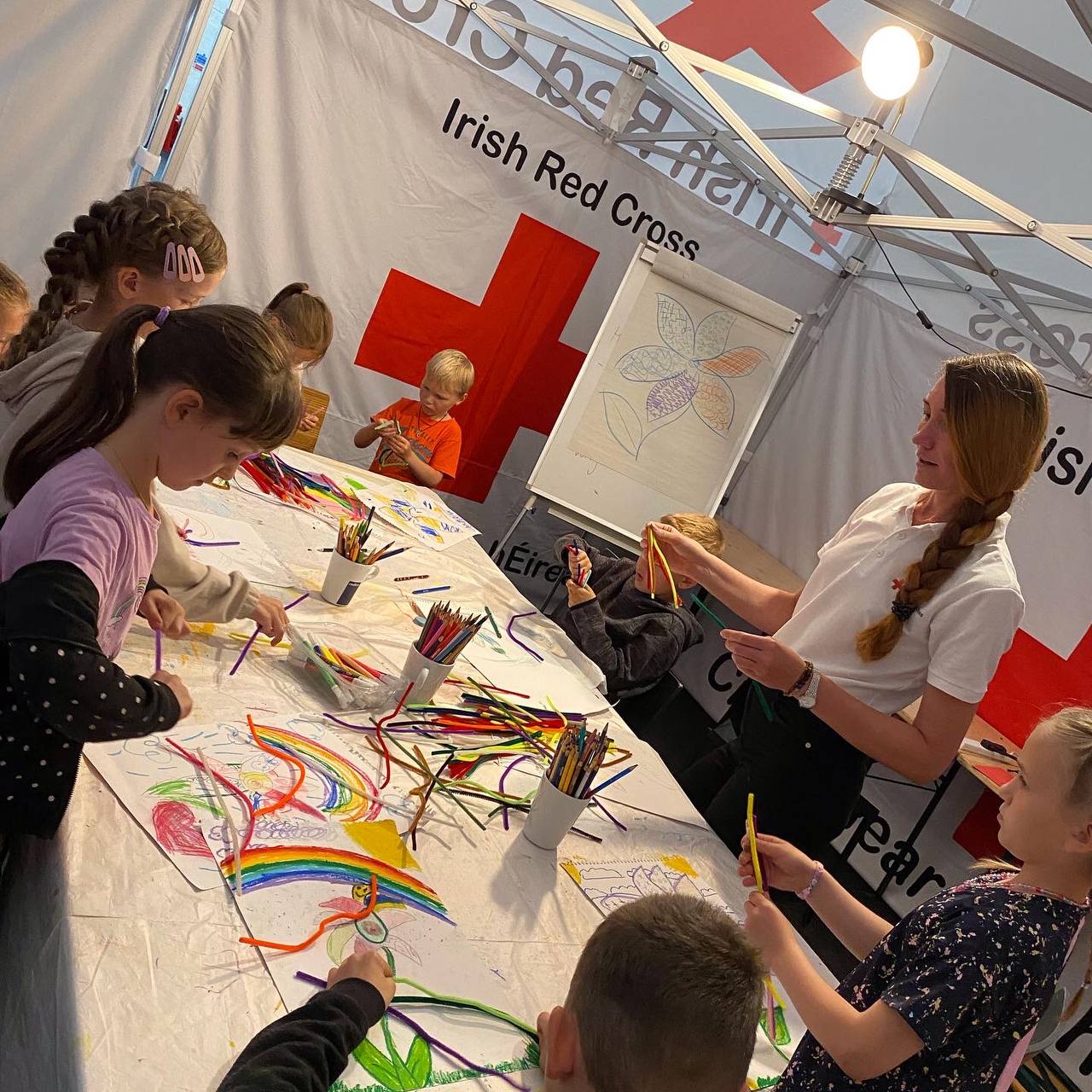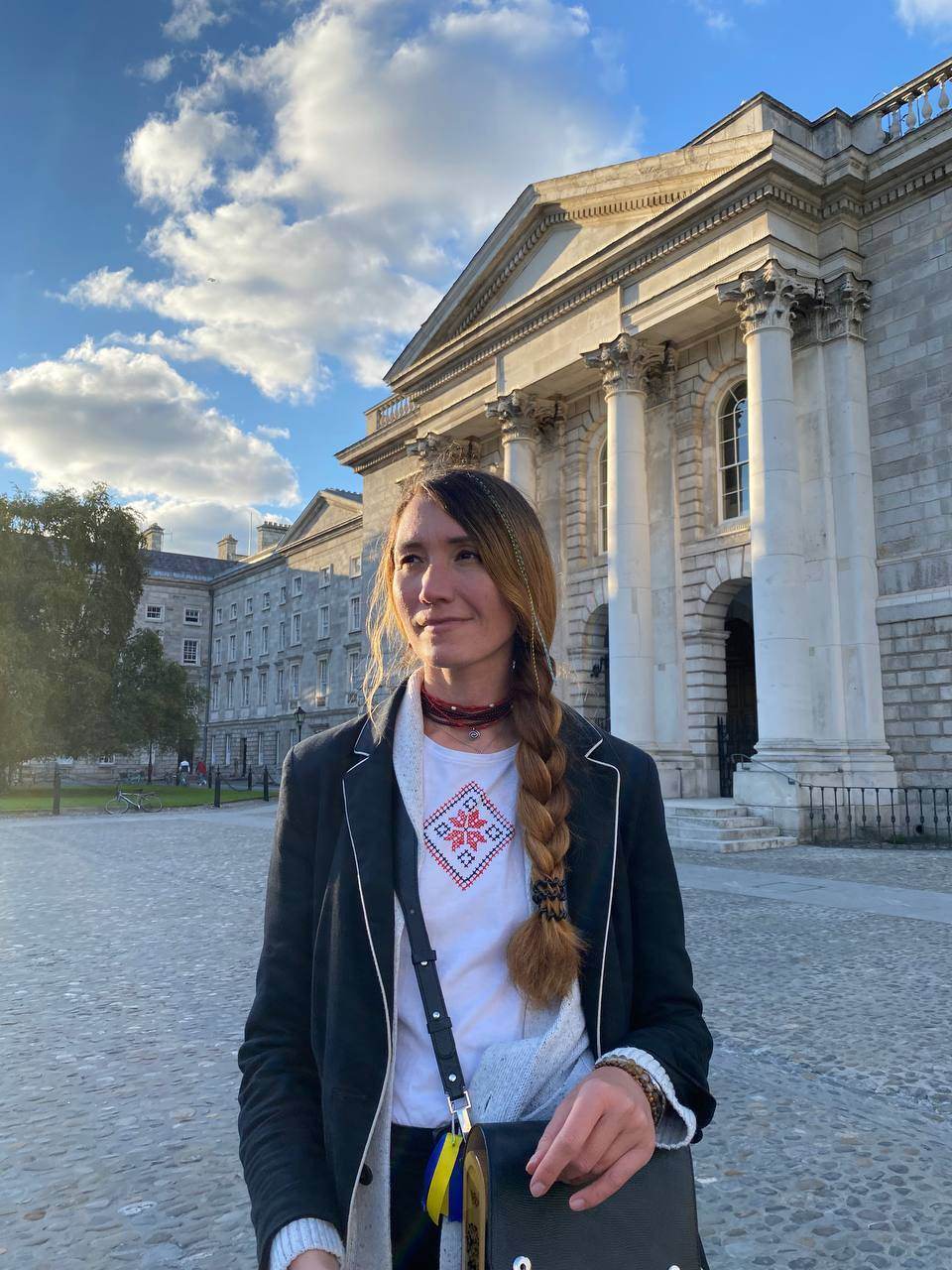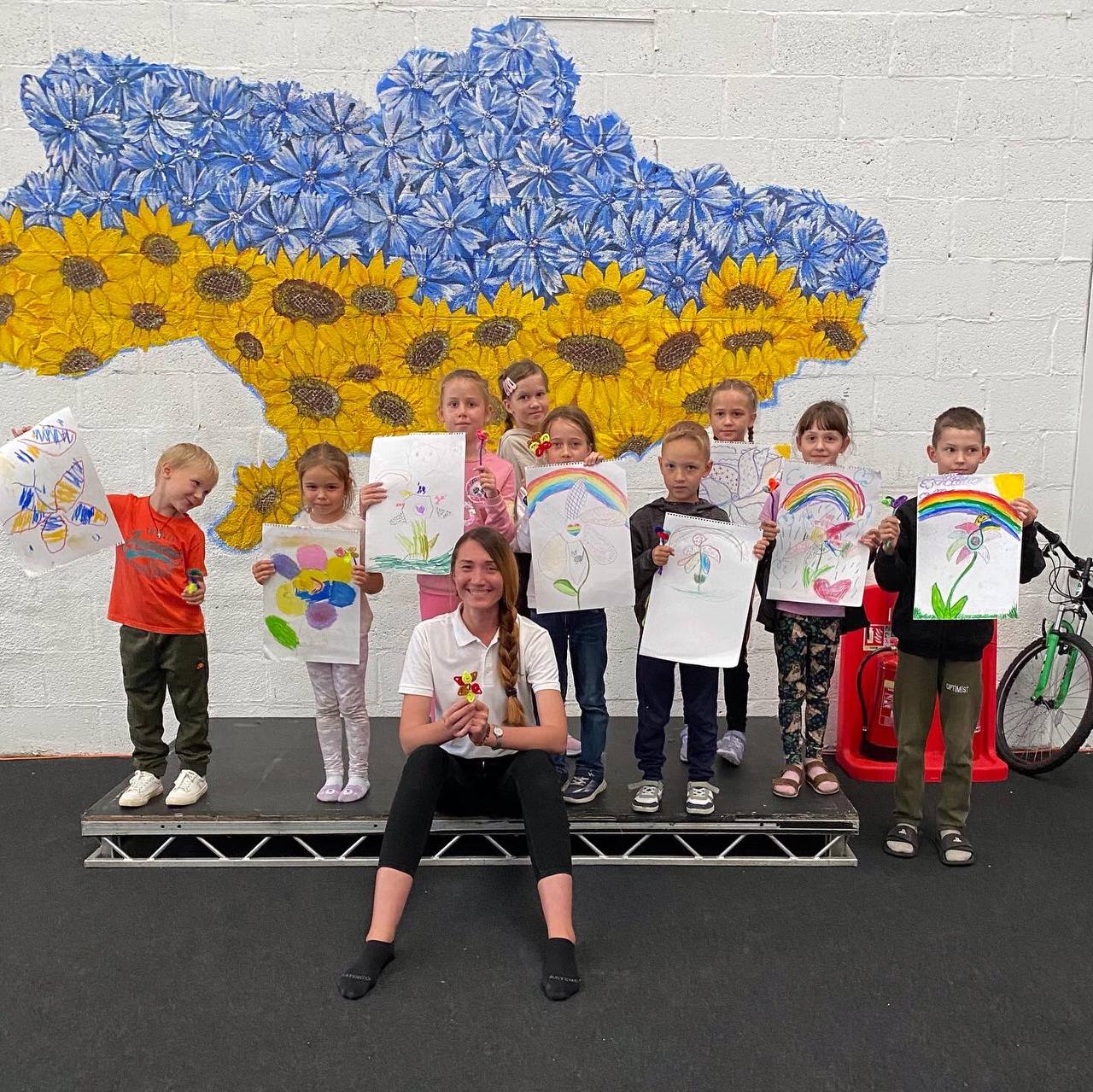Art therapist Oksana Tsymbalova, who hails from the southern Ukrainian port city of Odesa, has been living a new life in the capital of Ireland, Dublin, for eight months.
JOIN US ON TELEGRAM
Follow our coverage of the war on the @Kyivpost_official.
She got here because of the war. Her life has changed a lot, but she continues to work with Ukrainian children who survived Russian occupation. She helps little Ukrainians to overcome big pain.
“I notice that these children need me. Through creativity, they draw, sculpt, and taste pain”.
Oksana is a certified clinical psychotherapist and this is her second higher education. Her first education was management, but she’s been working with kids and grown-ups in art therapy since 2019.
“I’ve always been interested in art therapy. This is the area in psychology that fascinated me the most. And I also like to teach because there are teachers among my ancestors. I like to mix different techniques in my classes. For example, drawing on textiles and painting stained glass”.
Oksana worked as an art therapist at the Museum of Interesting Science in her home city and also taught children how to sculpt. The art therapist also taught at a private school in Odesa. Here she worked with teenagers from 12 to 16 years old.
She also developed two author's courses. One is aimed at developing creative thinking in children aged from 3 to 7 years. The second course is for children from seven years of age and teenagers.

Trump Makes 90 Day Foreign Aid Freeze – Ukraine Military Support Supposedly Untouched
Oksana does lots of volunteering in Dublin, and also works with the children of Ukrainian immigrants. Her students include children from all over Ukraine, including the cities of Mariupol, Bucha, Kherson, and Kharkiv, which were occupied by Russian forces for a long time.
“I work with different children. Some of them experienced real horrors. They saw their relatives die. Other children stayed in a shelter for months. The most difficult thing about working with such children is that they are mostly silent. However, they pour out their pain in art. This is nice. In fact, аrt therapy is designed to help them get over traumatic experiences. Therefore, during classes, children can draw, sculpt and sometimes even just shout out their pain. The therapy can heal them”.
Oksana advises parents whose children have experienced horrors, to be honest with their children and not be afraid to talk about them. .
“It is crucial to experience this emotion. Speak it, draw it, shout it out. Children should not keep it to themselves, because then it will be much more difficult in the future. You can help your children with this. For this, you just need to be close to and love the child”.
It was at the beginning of 2022 that Oksana realized she was burnt out and needed a break, so she went on vacation to Thailand.
“The war found me in here. I came here 10 days before the start of the war. It was my first holiday in many years. It was crucial for me because I felt that I was burnt out. I worked a lot with people as an art therapist. Therefore, I demanded a reboot for me”.
When the war began
The start of the war prompted Oksana to think about what to do next. She decided not to return to Odesa because the city was being shelled. Oksana’s next stop was abroad.
“I was looking for an English-speaking country. It was so essential for me because I wanted to learn English. I thought about Great Britain or Ireland. I even managed to get a visitor's visa in Scotland, but I decided to go to Ireland. What is more, I have never regretted my choice.”
Oksana has been living with hosts Lisa and Alan for eight months. They have two sons. The eldest is 13 years old, the youngest is 3.
“The volunteers gave me a form to fill out even before I arrived in Ireland. I stated my wishes in it. It was essential for me to stay in Dublin because most Ukrainians are here. Besides, it is important for me to live in a big city and to be in a creative environment. On arrival I was accommodated in Citywest. This is a large hub where Ukrainians arriving in Ireland are settled. But the next day I was told that volunteers had found hosts for me, and within an hour, my host lady Lisa came to my place and took me away.”
Thoughts about Odesa
Oksana has of late been thinking of resuming online classes with her students in Odesa.
"The majority of my students have either gone abroad or to other cities in Ukraine. Just 20 percent of my pupils are still in Odesa. However, they regularly ask about returning to classes. I’m now working on doing online classes with them."
In addition to volunteering and working with children, Oksana studies English intensively. She spends four hours a day every day getting to English courses and back. But she assures that it’s worth it.
“In just a few months, I was able to move from the initial level to B2. I hope that I will soon be able to speak English fluently”.
However, despite her success in learning English, Oksana plans to return home after the war.
"I miss Odesa very much. Besides, I understand how I can be useful to my native city. That's why I’m planning to return. I consider my stay in Ireland an opportunity for self-improvement. I study English and read a lot about architecture and urban planning. Although I would like to return home when it becomes safe. But I will always be grateful to Ireland for its hospitality."
Besides, her parents are still in Odesа. They flatly refused to leave their home.
“My mother's maiden surname is Pokotylo, this is an old Cossack surname. She comes from Puzhaikovo. It was once a large Cossack settlement on the way. Cossack families don’t know how to run away from difficulties, it overcomes them. That’s why I overcome all the obstacles that stand before me”.
You can also highlight the text and press Ctrl + Enter


